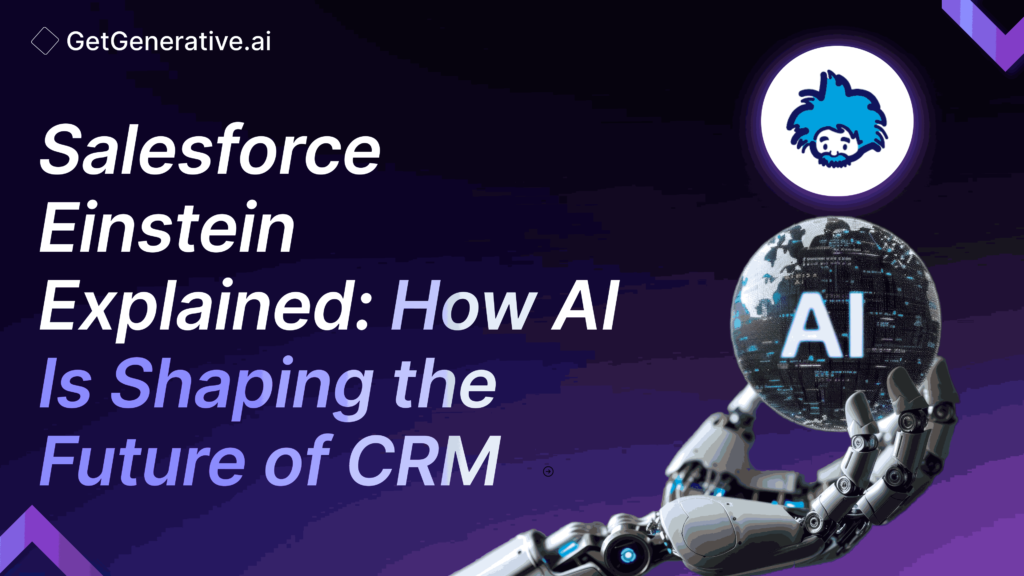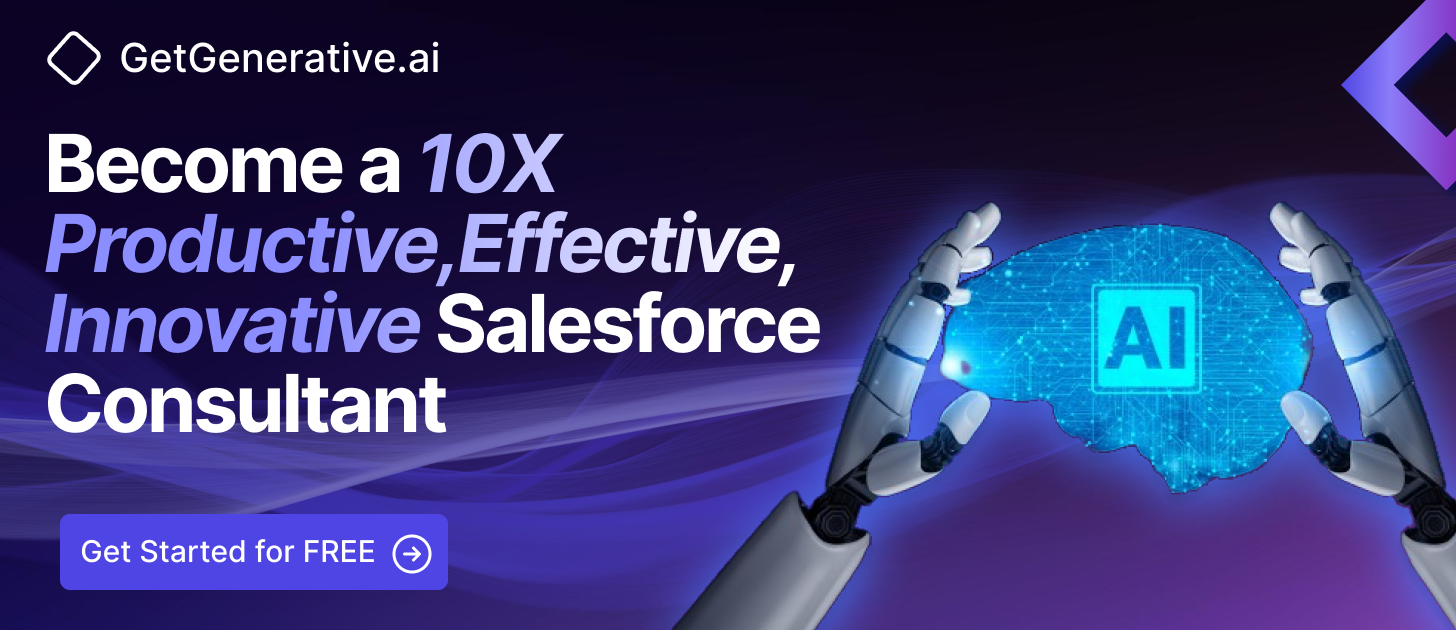Salesforce Einstein Explained: How AI Is Shaping the Future of CRM
Salesforce Einstein is one such innovation, a powerful AI-driven tool integrated within the Salesforce platform. It promises to revolutionize businesses’ operations by offering advanced analytics, predictive insights, and automated processes.
This blog explores Salesforce Einstein, its workings, benefits, and features, and addresses common questions about its implementation and capabilities.
What is Salesforce Einstein?
Salesforce Einstein is an AI-powered assistant designed to enhance the capabilities of the Salesforce Customer Relationship Management (CRM) platform. By leveraging artificial intelligence and machine learning, Einstein enables businesses to make smarter decisions, predict future trends, and automate routine tasks, ultimately improving efficiency and customer satisfaction.
How Does Salesforce Einstein Work?
Salesforce Einstein operates by embedding advanced AI technologies directly into the Salesforce platform, providing users with intelligent, data-driven insights and automation capabilities. Here’s a detailed breakdown of how Salesforce Einstein works:
Data Collection and Integration:
- Data Sources: Salesforce Einstein collects data from various sources, including customer interactions, sales histories, emails, social media, and IoT devices. This comprehensive data collection ensures a holistic view of customer behavior and business operations.
- Data Integration: The collected data is seamlessly integrated into the Salesforce platform. Einstein uses Salesforce’s robust data integration capabilities to ensure that data from different sources is unified and standardized for analysis.
Data Preparation:
- Cleaning and Normalizing Data: Einstein automatically cleans and normalizes data, removing duplicates, correcting errors, and standardizing formats. This step is crucial for ensuring the accuracy and reliability of AI models.
- Feature Engineering: Einstein performs feature engineering, identifying and creating relevant features from raw data used in predictive models. This includes extracting meaningful patterns and transforming data into formats suitable for machine learning.
Machine Learning Model Training:
- Model Selection: Einstein leverages various machine learning algorithms, such as linear regression, decision trees, and neural networks, to build predictive models. The choice of algorithm depends on the specific use case and the nature of the data.
- Training: The AI models are trained using historical data. During training, Einstein learns the relationships between different data points and outcomes. This involves splitting the data into training and validation sets to fine-tune the model’s accuracy.
- Continuous Learning: Salesforce Einstein continuously learns from new data, updating its models to improve predictions and recommendations over time. This ensures that the insights provided remain relevant as business conditions change.
Also Read – Salesforce Einstein Intent: A Comprehensive Guide
Predictive Analytics and Insights:
- Scoring and Predictions: Once the models are trained, Einstein scores new data in real-time to generate predictions. For example, it can predict which leads are most likely to convert, which customers are at risk of churning, or the expected revenue for the next quarter.
- Automated Insights: Einstein Discovery provides automated insights by analyzing data patterns and identifying key drivers behind business outcomes. These insights are presented in an easy-to-understand format, highlighting trends, anomalies, and actionable recommendations.
Automation and Actionable Intelligence:
- Workflow Automation: Einstein automates routine tasks such as data entry, lead scoring, and follow-up actions. For instance, it can automatically route high-priority leads to sales representatives or trigger marketing campaigns based on predictive scores.
- Next Best Action: Einstein recommends the next best action for users based on predictive analytics and business rules. This feature helps sales reps, marketers, and service agents take the most effective actions to achieve desired outcomes.
- Einstein Bots: AI-powered chatbots handle customer inquiries, provide personalized responses, and escalate complex issues to human agents when necessary. These bots enhance customer service by offering instant, accurate assistance.
Natural Language Processing and Computer Vision:
- Einstein Language: Utilizes natural language processing (NLP) to analyze text data from emails, social media, and chat interactions. It can classify intent, sentiment, and key entities, enabling more personalized and effective communication.
- Einstein Vision: Employs computer vision to analyze images and recognize objects, brands, and scenes. This feature is particularly useful for industries like retail and manufacturing, where visual data is abundant.
By leveraging these sophisticated AI capabilities, Salesforce Einstein transforms raw data into actionable insights and automates processes, helping businesses make data-driven decisions, improve efficiency, and enhance customer relationships.
Benefits of Salesforce Einstein
Salesforce Einstein offers numerous benefits to businesses, including:
- Enhanced Decision-Making: By providing data-driven insights and predictions, Einstein empowers businesses to make informed decisions quickly.
- Increased Efficiency: Automating routine tasks such as data entry and analysis allows employees to focus on more strategic activities.
- Improved Customer Relationships: Personalized recommendations and predictive analytics help businesses better understand and meet customer needs.
- Scalability: Salesforce Einstein can scale with your business, accommodating increasing data and complexity.
Also Read – Salesforce Einstein Copilot – The Ultimate Guide
Salesforce Einstein Features
Salesforce Einstein offers a suite of powerful AI-driven features designed to enhance various aspects of business operations. Here’s a detailed look at these features:
Einstein Prediction Builder:
- Custom AI Models: Enables users to create custom predictive models tailored to their specific business needs without requiring any coding knowledge. For example, a sales manager can build a model to predict the likelihood of lead conversion based on historical data.
- Predictive Insights: Provides actionable insights by analyzing patterns in historical data to forecast future outcomes. This helps businesses anticipate trends and make informed decisions.
- Intuitive Interface: The user-friendly interface guides users through model-building, from selecting the dataset to defining the prediction goal and evaluating the model’s accuracy.
Einstein Discovery:
- Automated Data Analysis: Einstein Discovery feature uses machine learning to analyze large datasets and uncover hidden patterns, correlations, and trends. It helps users understand the factors driving their business metrics.
- Insight Generation: Generates easy-to-understand insights and visualizations highlighting key findings, such as the top predictors of sales performance or customer churn.
- Recommendation Engine: Provides actionable recommendations based on data analysis, helping businesses optimize their strategies and operations.
Einstein Bots:
- AI-Powered Chatbots: Automates customer service interactions by handling common inquiries, providing personalized responses, and escalating complex issues to human agents when necessary.
- Customizable: Users can customize the bot’s responses, workflows, and integration points to align with their specific business processes and customer service standards.
- Multichannel Support: Einstein Bots can be deployed across various channels, including websites, mobile apps, and messaging platforms, ensuring consistent customer support.
Einstein Vision and Language:
- Einstein Vision: Uses deep learning algorithms to analyze images and recognize objects, scenes, and text. This feature is useful for visual search, product identification, and quality control applications.
- Einstein Language: Employs natural language processing (NLP) to analyze and classify text data from emails, social media, and chat interactions. It can determine sentiment, intent, and key entities, enabling more personalized and effective communication.
- Pretrained Models: Provides pre-trained models for common use cases, such as sentiment analysis and image classification, allowing businesses to deploy AI solutions quickly without extensive data science expertise.
Also Read – Salesforce Einstein Vision: Advanced Image Recognition
Einstein’s Next Best Action:
- Predictive Recommendations: Based on predictive analytics and predefined business rules, it can suggest the most appropriate actions for users. For example, it can recommend the next best offer to present to customers based on their purchase history and preferences.
- Contextual Guidance: Offers real-time, contextual guidance to sales reps, marketers, and service agents, helping them make the right decisions at the right time.
- Seamless Integration: Integrates seamlessly with other Salesforce products and workflows, ensuring that recommendations are actionable and aligned with business objectives.
Einstein Analytics:
- Advanced Data Visualization: Provides interactive dashboards and visualizations that allow users to explore data and uncover insights. Users can drill down into specific metrics, filter data, and create custom views to suit their needs.
- Automated Data Discovery: Uses AI to automatically identify significant patterns and trends in data, presenting users with key findings and recommendations.
- Integration with Salesforce Data: Leverages data from across the Salesforce platform, including Sales Cloud, Service Cloud, and Marketing Cloud, to provide a comprehensive view of business performance.
Einstein Voice:
- Voice Commands: This feature allows users to interact with the Salesforce platform using natural language voice commands. For example, sales reps can update records, retrieve information, and schedule tasks hands-free.
- Voice-Activated Insights: This feature provides real-time insights and notifications based on voice queries, enabling users to quickly access critical information without navigating through the interface.
- Custom Voice Skills: Businesses can develop custom voice skills tailored to their needs, enhancing the platform’s functionality and user experience.
By offering these comprehensive features, Salesforce Einstein empowers businesses to harness the power of AI to drive efficiency, improve decision-making, and enhance customer engagement across various functions and industries.
Is Salesforce Einstein Easy to Implement?
Implementing Salesforce Einstein can be straightforward, especially for businesses already using the Salesforce platform. The integration is seamless, and Salesforce provides extensive documentation and support to assist with the setup. However, businesses may need to invest time in training and data preparation to leverage Einstein’s capabilities fully.
Does Salesforce Einstein Support Voice Commands?
Yes, Salesforce Einstein supports voice commands through its Einstein Voice feature. This functionality allows users to perform tasks, access data, and receive insights using natural language, making the platform more accessible and user-friendly.
The Future of Salesforce Einstein: Trends to Watch in 2025
1. Generative AI for Enhanced Personalization
The integration of generative AI into Salesforce Einstein, exemplified by tools like Einstein GPT, is revolutionizing customer engagement. Businesses can now create hyper-personalized emails, marketing content, and recommendations tailored to individual customer preferences, driving deeper connections and higher conversions.
2. Predictive AI for Proactive Customer Strategies
Predictive analytics is becoming more sophisticated, allowing Einstein to forecast customer behavior with unprecedented accuracy. Businesses can anticipate customer needs, detect potential churn risks, and identify upselling opportunities, ensuring proactive strategies and a competitive edge.
3. Integration with IoT for Real-Time Insights
With the growing adoption of IoT devices, Einstein is set to leverage real-time data streams for actionable insights. For example, in industries like manufacturing, IoT data integrated with Einstein can predict equipment failures, optimizing maintenance schedules and minimizing downtime.
4. Voice-Driven CRM Evolution
Einstein Voice is becoming more advanced, offering natural language processing (NLP) capabilities that allow users to interact seamlessly with their CRM. By integrating voice commands with predictive analytics, sales reps and service agents can access insights, update records, and take actions on the go, making CRM truly hands-free.
5. AI-Driven Data Ethics and Bias Mitigation
As AI adoption grows, Salesforce Einstein is focusing on ethical AI practices. Features like bias detection and explainability are becoming standard, ensuring that predictions and recommendations are fair, transparent, and compliant with global regulations.
6. Industry-Specific AI Models
Einstein is developing industry-specific AI solutions tailored to unique challenges in healthcare, finance, retail, and more. For instance, Einstein Vision can assist in medical diagnostics, while Einstein Bots can streamline customer service in banking.
Conclusion
Salesforce Einstein is a game-changer in CRM, offering businesses powerful AI-driven tools to enhance decision-making, improve efficiency, and foster better customer relationships. Its range of features, including predictive analytics, automated insights, and voice commands, makes it a valuable asset for any organization looking to stay ahead in a competitive market.
Enhance your consulting process with GetGenerative.ai. Seamlessly create impressive proposals, allowing you to focus on delivering exceptional client service.
Start today!
Frequently Asked Questions (FAQs)
1. What is Salesforce Einstein?
Salesforce Einstein is an AI-powered assistant integrated into the CRM platform to enhance decision-making, predict trends, and automate tasks.
2. How does Salesforce Einstein work?
It uses AI algorithms and data from various sources to create predictive models and provide insights.
3. What are the key benefits of using Salesforce Einstein?
Enhanced decision-making, increased efficiency, improved customer relationships, and scalability.
4. What features does Salesforce Einstein offer?
Prediction Builder, Einstein Discovery, Einstein Bots, Einstein Vision and Language, among others.




